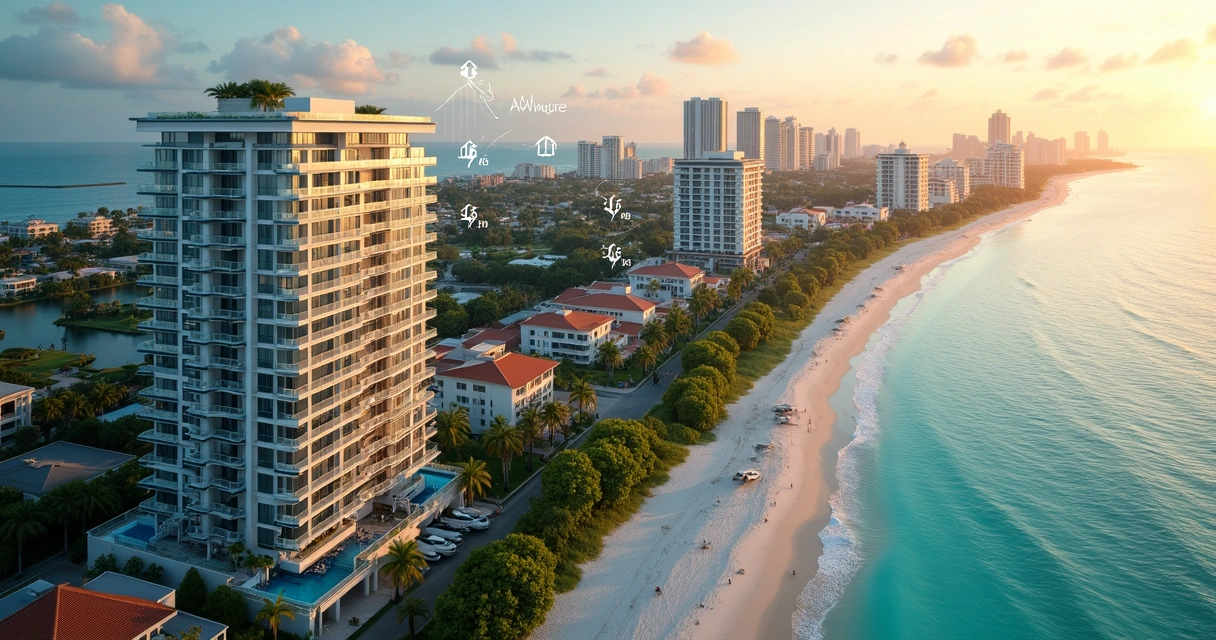For years, I watched people around me dream about buying a property in Florida. Some saw it as a way to own a piece of paradise, others as a solid path to build wealth or diversify assets. I realized that, although the landscape looked inviting, there were many doubts and, yes, some risks. But with the right information, caution, and a good team, even a first-time investor could see promising results. In this article, I’ll walk you through seven key steps I would share with anyone considering putting down roots—or building a business—in the Sunshine State.
Why Florida keeps attracting real estate investors
There’s something almost magnetic about Florida. Maybe it’s the beaches, the vibrant cities, or the promise of growth. In my research and conversations, I noticed how international investors are especially drawn to the region. With Miami and Orlando seeing strong population growth and a steady flow of tourists, the demand for housing and vacation rentals just keeps rising. According to recent studies from the University of Florida Warrington College of Business, the state experienced a shortage of nearly 2.7 million units between 2018 and 2023. That means fierce competition, higher home prices, and, for many, the possibility of attractive returns.
Florida’s market is shaped by national and global economic factors. Research from the University of Florida indicates that about 79% of pricing trends trace back to these broader influences. If you’re reading this from abroad or planning a major move, this interconnectedness should reassure you that you’re not alone in tracking these things.
1. Understanding the Florida market landscape
The first time I looked at the Florida housing market, it felt almost overwhelming—so many cities, each with their own flavor, price ranges, and investment profiles. But after some careful study, a few patterns became clear.
- Miami: A global city, where international buyers and seasonal visitors keep demand high.
- Orlando: Driven by the tourism industry, a hotspot for vacation rentals and year-round tenants.
- Tampa, Jacksonville, Sarasota: These cities show steady growth, expanding job markets, and relative affordability, according to the 2024 University of Florida IFAS Extension market trends.
Florida’s real estate market feels both local and global.
Supply hasn’t always kept up with demand. Median single-family home prices climbed nearly 10% in early 2023, pushing many buyers to act fast, as highlighted in an analysis from Florida TaxWatch. If you’re thinking about investing, knowing these trends can help you decide whether a property is more likely to appreciate quickly or become a reliable rental asset.
2. Choosing your investment type: what fits best?
I still remember my first real estate workshop—people debated condos versus single homes, short-term versus long-term rentals, land versus commercial spaces. Each option brings different risks, market cycles, and financing paths. Here’s how I usually break it down:
- Residential properties: Single-family homes, condos, or townhouses. Ideal for those seeking vacation rentals or long-term tenants in growth cities like Orlando.
- Commercial properties: Office spaces, retail, or industrial parks. These often mean higher entry costs but, in the right area, can yield robust returns tied to business trends.
- Vacant land: Some see this as speculative. If you’re patient, you can benefit from future zoning changes or urban sprawl in cities on the rise.
Not sure where to start? The Heart Mortgage resource on 7 strategies to start real estate investing provides practical examples for each scenario. Sometimes all you need is to see how other investors have succeeded—or avoided mistakes.

3. Decoding property financing: why mortgages matter
Once, a friend insisted on paying cash in the United States, thinking it would cut through red tape. In some rare situations, it might help—but for most investors, especially those overseas, leveraging local financing options like mortgages can increase cashflow and returns, and leave extra funds for renovations or additional purchases.
American banks, and specialist firms such as Heart Mortgage, offer attractive terms even to non-residents. They weigh your credit, down payment, and (sometimes) rental income projections. Mortgages with fixed or variable rates can stretch for 15 to 30 years. It pays to shop around, compare rates and conditions, and—if you don’t feel confident—get support from a mortgage broker who knows the territory.
- First-time buyer programs are often available and can lower your initial investment requirements. Look for more details on the Heart Mortgage first-time home buyer page.
- Conventional loans provide flexibility for experienced investors or those with higher down payments, such as those explained at the conventional loan guide from Heart Mortgage.
I can’t stress this enough: Choosing the right mortgage is the backbone of real estate investment. Get this part right, and you’re already ahead of the crowd.
4. Weighing legal and tax factors before you commit
Here’s where things get real. I’ve seen investments slow down—or fall apart—when someone skips over legal details. Florida’s rules are foreigner-friendly, sometimes more transparent than other U.S. states. But clear doesn’t mean simple.
- Property taxes: Calculated annually and vary by county, often based on the assessed market value.
- Income (from rentals): Typically subject to federal taxes, sometimes state ones too, depending on entity structure and residence status.
- Ownership: You can buy as an individual, a company (LLC, corporation), or a partnership—each brings different reporting and protection requirements.
Rental laws are also strict about contracts, deposits, and tenant rights—so check them carefully. If you’re browsing the investment guides at Heart Mortgage’s blog, you’ll spot advice on when it helps to consult a local real estate attorney or a tax advisor specializing in foreign investors.

5. Running the numbers: what every beginner should know
I love a good spreadsheet, but not everyone does. Even if you’re not a numbers enthusiast, keeping a breakdown handy makes a big difference. Here’s what I track (and what I recommend for newbies):
- Purchase cost: Listing price, closing costs, inspections, and transfer fees.
- Financing: Mortgage rates, monthly payments, and total interest paid across the loan life.
- Ongoing expenses: Insurance, property taxes, maintenance, property management, and possible HOA fees.
- Projected returns: Expected rent, seasonal variations (if vacation property), and appreciation rates.
Profit isn’t guaranteed—the real work is in the due diligence.
Rising prices in recent years can make entry more expensive, but also mean appreciation potential over time, especially in high-demand cities.
6. Understanding the balance: rewards, risks, and trends
I wish I could tell you that investing in Florida real estate is risk-free. It’s not. Hurricanes, insurance hikes, and sometimes even local regulations can throw a wrench in the plans. Yet, the rewards—solid rental returns, asset appreciation, and currency diversification for foreigners—still appeal to many.
Population growth (immigrants, retirees, digital nomads) won’t slow down soon. Vacation rental demand remains robust, especially near theme parks or the coast. And while some markets show stabilizing inventory, others, like Miami and Sarasota, continue to face constrained supply.
It’s less about timing the market perfectly, and more about understanding your risk tolerance and planning for the long haul. If you want a deeper dive, there are plenty of practical starting tips in the Heart Mortgage guide on investing successfully.
7. Leaning on expertise: why professional support matters
In my own experience, the difference between a stressful investment and a smooth one often comes down to the team you choose. Having support from seasoned mortgage specialists, real estate agents, property managers, and local advisors in Florida can help you sidestep mistakes and maximize gains. That’s one reason Heart Mortgage stands out—offering step-by-step guidance for international and first-time investors who want a clear, honest process.
From my observations, the most successful investors aren’t always the ones with the most money—they’re the ones who ask for help at the right moments, and trust people with local experience. That might mean letting an agent negotiate, having Heart Mortgage explore the best financing options, or consulting a tax expert about the best way to structure ownership as a foreigner.

Conclusion: It’s your move in Florida’s property market
Now that I’ve seen both the pitfalls and rewards up close, I truly believe that anyone—from distant beginners to seasoned pros—can make a wise investment in Florida real estate with good preparation. The path isn’t always clear, but the mix of population growth, tourist demand, and rising home values makes for a unique opportunity—especially in standout markets like Miami and Orlando. If you want stable income, diversification, or a personal getaway, all the data suggest this state is worth your attention.
The most important next step? Reach out for personalized support, whether that’s guidance through the mortgage process, legal insights, or recommendations on property types. At Heart Mortgage, my colleagues and I dedicate ourselves to helping investors feel confident—from first question to final signature. Ready to explore your options? Connect with us to start building your future in Florida today.
Frequently asked questions
What is the process to buy property in Florida?
Buying property in Florida usually starts with finding the right home or investment, making an offer, and signing a purchase agreement. After that, you’ll typically conduct inspections, negotiate any repairs, secure financing or a mortgage, and then complete the transaction at closing, when ownership transfers to you. Legal representation and a title company often help ensure everything goes smoothly and following local regulations is straightforward.
How much do Florida investment properties cost?
Costs vary widely by city and property type. For example, in early 2023, median single-family home prices in Florida increased by nearly 10%, with typical prices ranging from $300,000 in cities like Orlando to well over $600,000 in areas of Miami or the coast. Condos, commercial properties, and vacant land will price differently. Always add closing costs, taxes, and ongoing expenses to your calculations.
Is it worth investing in Florida real estate?
In my opinion, the answer is generally yes—especially if you can plan for long-term returns and are willing to work with local experts. Florida’s strong population growth, limited housing supply, and thriving vacation rental demand suggest ongoing appreciation and income potential. However, you should consider potential downsides, like weather risks and fluctuating mortgage rates, before committing.
Where are the best areas to invest in Florida?
Miami and Orlando often attract global interest for their mix of job growth, tourism, and rental demand. Tampa, Jacksonville, and Sarasota offer steady growth and, sometimes, more affordable entry points. Your ideal location depends on your investment aims—quick rental yield, future appreciation, or a combination. Local market trends, as detailed by trusted sources like the University of Florida IFAS Extension, can guide your choice.
What taxes apply to property investors in Florida?
Florida property investors face annual property taxes based on the home’s assessed value. Rental income is subject to U.S. federal income tax, and short-term rentals may face extra local tourist or sales taxes. If you’re a foreign investor, you’ll have additional tax requirements such as FIRPTA withholding when you sell. Consulting a tax advisor early on is my best advice—stay informed, not surprised.





